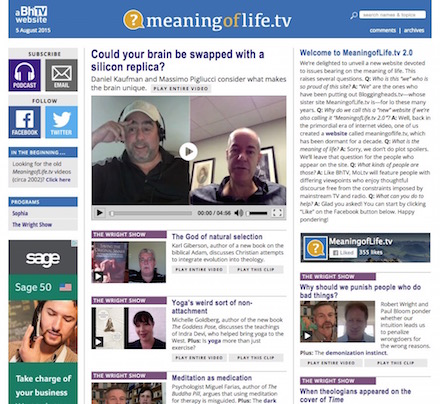Bloggingheads.tv, founded in November 2005, was the first website devoted to split-screen video dialogues about politics and ideas.
Combining sophisticated conversation with a casual look-and-feel, Bloggingheads.tv (BhTV) has established itself as the blogosphere’s premier site for video dialogue about public affairs. Its conversations between bloggers, journalists and scholars reach an engaged and influential audience both onsite and through a distribution network that includes high-traffic blogs and other major websites.
The ideological diversity and civil tone found in BhTV dialogues stands in contrast to the tendency of the internet to create ideologically homogenous “cocoons” of like-minded people who disparage opposing views without closely examining them. In that sense Bloggingheads is counteracting the tribalizing tendency of the internet — a tendency that is partly responsible for the much-noted polarization of American politics. Bloggingheads has shown its ability to bridge not just ideological chasms within America but gaps between cultures and nations, hosting, for example, a constructive conversation between an Israeli journalist and an Egyptian Al Jazeera correspondent.
BhTV takes pride in the diversity of opinions aired in its dialogues — and also in its viewer forum, where thoughtful disagreement is expressed in (mostly) civil terms. This contrasts with the strong ideological bent of most politically oriented websites, and with the acrimonious atmosphere of many comment sections on the internet.
MeaningofLife.tv, a spinoff of Bloggingheads.tv, was launched in July 2015. MoLtv focuses on the “big questions,” hashed out by philosophers, scientists, theologians, therapists, meditation teachers, monks — and people with no specific credentials but an important story to tell.
Topics under discussion are commensurately diverse, ranging from the more cosmic parts of science (big bang, quantum weirdness) to the more human parts of science (evolutionary psychology, neuroscience) to philosophy (mind-body problem, stoicism, existentialism) to religion and spirituality (higher purpose, the problem of evil, Buddhist and Hindu philosophy) to social science (Does history have a direction? Are people getting better? Worse?) And beyond these high-end intellectual questions are the concrete issues that people encounter in the daily domains of family, friendship, work, and play.


